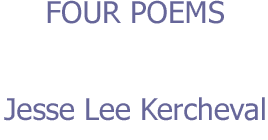

|
5000 years ago & already religion over turns religion—
fells a 16 ton menhir carved with deer a running hare
& hauls it to the shore onto a barge for the trip
to this shale island lost among a sea of islands
buries the pictographs inside a fresh dug dolman
covers them with pounded earth
because like Islam 3000 years later
this new faith does not show its God in pictures
but rather in abstraction in sweeping curves &
circles inside circles—
God with her daughters resting in her—
They had come so far—these first human farmers
Plants grew & cows gave birth when & where they ordered
Everything was possible—everything was new
So the menhir from the old believers hunters/ gatherers was buried—
then time covered the new religion to
these people
as time will cover ours—
now we walk to board our boat & find the tide dropped 20 feet
leaving our poor boat stranded in a bay of sticky mud
the earth sleeps the sea never
so I’m left with time to wonder
why sit in the dark etching circles into limestone
with nothing but a sharp quartz pebble?
Why make the ordered marks already fading on this page?
because you do not draw a human head to show the face of God
Paris is an egg. It is the egg. Wide or narrow, it is a ribbon of pastry, of moonlight, of butter. Paris is the light gliding over our eyelids, sneaking in even when we try not to see. We know ourselves through Paris & in this Paris is as private as blood & as public as humiliation in high school. I broke a molar on a piece of popcorn watching Les Enfants du Paradis in Paris, watching that luminous cloud Arletty playing the heroine Garance. Like the flower, she says after giving her name. What flower? the audience always murmurs. Me too— & that’s what I love— the not knowing. Just as no one in the Paris of the film can truly know Garance.
But what with the cracked tooth, watching this film about Paris in Paris turned out not to be the rush of paradise I expected, but instead, along with Baptise the mime, I was in agony. Baptise from his unconsummated love for Garance. Me from my molar, from the pain crashing through my nerves, & for a moment I thought ammonia & chlorine bleach had come accidentally together filling the whole theater because I was crying, because I couldn’t breathe.
Then Paris took me out of myself & into the souls of the stars, filled me with great pity, with a sense infinite space as poignant actuality, as the light from the projector shone over the heads of the audience. But there is more, much more to Paris than that. In Paris, life runs away, is a runaway at play & passion is everywhere. Paris dangles all possibilities before us, clanging as loud as bells. The mind sees as through a glass--Heaven. The heart sees--as through a moving curtain— worlds beyond the bones of everyday.
I escaped America in a hot air balloon
the same way my great grandmother escaped the siege of Paris
I floated out of Florida, across the iron gray Atlantic, headed for France land where I was born,
reading waves, stars, finally maps, looking for the lights that signal Paris
until by morning I was drifing past the Tour Eiffel, eye-high, safe enough
though a few Americans threw ice fished from their cups of Coca-cola.
The radio talked to me in French the way it did when I was little & I tried to understand
like a child without thinking without translation without knowing words are spelled with letters (but tell me—is that possible?)
is it possible to smooth a scar to baby skin—
is leaving ever painless? Is returning?
I honestly don’t know but I did escape America
& let me tell you— I am never going back.
In this garden enclosed by a stone wall on this stone island where the stone houses have stone roofs— my son twists on a wooden swing
In between cold rock shore & cold rock shore, this garden bleeds w/ roses the bruised kiss of fuschia Beyond the wall, in the low & marshy land sheep crop the sweet salt grass
This could be my stone house—Kercheval in the land where ker means home, It could be my parents in the cemetery close inside the church yard walls—my father grandfather
lost at sea lost to war
their faces still young in the enameled photographs that grace the cemetery walls or hang in honor
in the Chapel of the Rescuers—
resting place for those who died searching for neighbors/other islanders lost in the slate grey sea.
Who have I saved lately?—a Breton 300 years gone from this stone land— long ago set sail across the wide and salty sea?
No one, I admit at least not lately & catch my son in my arms, hoping love—mine or God’s— will be enough save him First him, then my husband & then me |
![]()